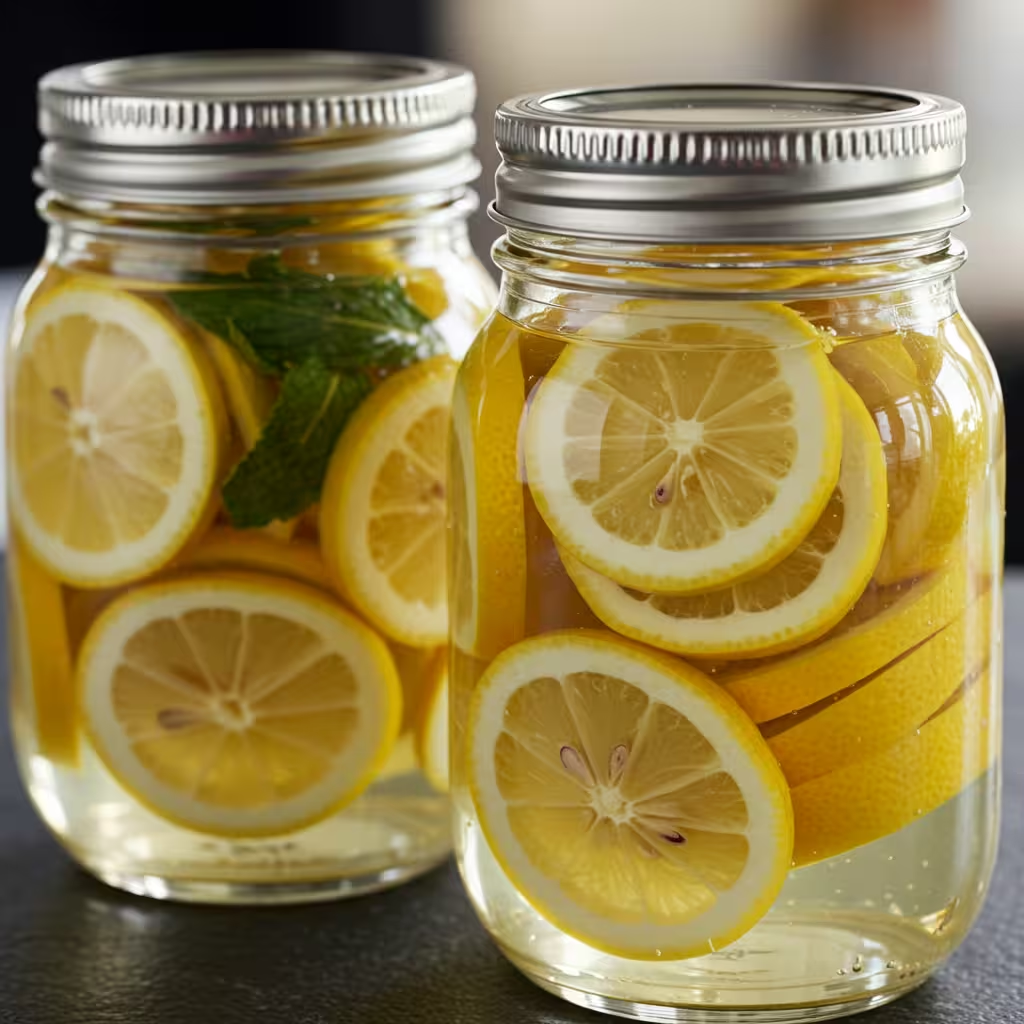In today’s health-conscious world, natural remedies are gaining tremendous popularity for their effectiveness and lack of side effects. Among these, lemon ginger tea stands out as a superstar beverage that combines incredible flavor with numerous health benefits. This traditional remedy has been used for centuries across different cultures, and modern science now confirms what our ancestors knew all along – this powerful combination works wonders for our bodies.
Why Lemon Ginger Tea Should Be Your Daily Health Ritual
Before diving into our detailed recipe, let’s understand why this golden elixir deserves a permanent spot in your daily routine. The synergistic combination of lemon and ginger creates a potent drink that does far more than just warm you up on a cold day.
The Science-Backed Benefits
Immune System Support: With cold and flu season always lurking around the corner, strengthening your immune system becomes crucial. Lemons are packed with vitamin C, a powerful antioxidant that helps combat free radicals and supports immune function. Ginger contains gingerol, a bioactive compound with powerful anti-inflammatory and antioxidant properties that further enhances immunity.
Weight Management Assistant: If you’re on a weight loss journey, this tea can be your faithful companion. Ginger has thermogenic properties that boost your metabolism and increase calorie burning. Meanwhile, lemons help improve digestion and detoxification processes, making weight management more effective.
Digestive Health Promoter: Both ingredients work harmoniously to aid digestion. Ginger has been used for centuries to calm upset stomachs, reduce nausea, and improve overall digestive health. Lemons stimulate the production of bile, which helps your body break down food more efficiently.
Natural Energy Booster: Unlike caffeine, which can lead to crashes, this tea provides sustained energy through natural compounds that support your body’s functions rather than artificially stimulating them.
Anti-Inflammatory Powerhouse: Chronic inflammation is linked to numerous health issues, from arthritis to heart disease. Both lemon and ginger contain compounds that help reduce inflammation throughout the body.
The Perfect Lemon Ginger Tea Recipe: Traditional Korean-Inspired Method
This recipe draws inspiration from traditional Korean preserving techniques, resulting in a concentrated tea base that can be stored and enjoyed for months. The addition of clear rice wine (cheongju) is a special touch that enhances preservation while adding subtle depth to the flavor profile.
Ingredients List
- 15 fresh lemons (preferably organic for best results)
- 200g fresh ginger root (look for plump pieces with smooth skin)
- 1.5 kg granulated sugar (white or raw sugar works equally well)
- ½ cup clear rice wine (cheongju) (this natural preservative extends shelf life)
- 2 tablespoons baking soda (for thorough cleaning of lemons)
- ¼ cup coarse salt (helps remove pesticides and wax from lemon peels)
Essential Equipment
- Sharp knife and cutting board
- Blender or food processor
- Fine mesh strainer or cheesecloth
- Large mixing bowl (glass or ceramic preferred)
- Sterilized glass jars with tight-fitting lids
- Wooden or silicone spoon for mixing
Detailed Step-by-Step Instructions
1. Proper Lemon Preparation (Critical First Step)
The way you clean and prepare your lemons significantly impacts the final taste and shelf life of your tea:
- Begin by placing lemons in a large bowl and sprinkling them with 2 tablespoons of baking soda.
- Using your hands, gently scrub each lemon to remove wax, pesticides, and other residues that might be present on the skin.
- Rinse thoroughly with cool water.
- Next, sprinkle coarse salt over the lemons and repeat the scrubbing process. The salt acts as a gentle abrasive, ensuring deep cleaning.
- Soak the lemons in fresh water for 10 minutes to remove any remaining chemicals.
- Rinse 3 more times with clean water.
- This thorough cleaning process is crucial because you’ll be using the entire lemon, including the peel, which can harbor pesticides and wax if not properly cleaned.
- After cleaning, pat each lemon completely dry with a clean kitchen towel. Any moisture left on the lemons can lead to mold development during storage.
2. Precision Lemon Slicing Technique
- Using a sharp knife, trim both ends of each lemon.
- Slice the lemons thinly (approximately 2-3mm thick) to maximize the surface area exposed to sugar, which helps with preservation and flavor extraction.
- As you slice, carefully remove any seeds you encounter. Seeds contain compounds that can make your tea bitter over time.
- Set aside three lemons and squeeze them to extract their juice, which will be used to blend with the ginger.
- Place all sliced lemons in a large glass or ceramic bowl.
3. Ginger Preparation and Extraction
- Peel the ginger thoroughly using the edge of a spoon (this minimizes waste compared to using a knife).
- Slice the peeled ginger into small pieces to help your blender process it more effectively.
- In a blender, combine the sliced ginger with the reserved lemon juice and ½ cup of clear rice wine.
- Blend on high speed until you achieve a smooth consistency.
- Pour this mixture through a fine cloth or cheesecloth, squeezing firmly to extract all the ginger juice.
- Allow the strained juice to rest for 30 minutes. This resting period is important as it allows the ginger starch to settle at the bottom.
- After resting, carefully pour the clear ginger juice into the bowl with sliced lemons, leaving behind the settled starch at the bottom (which can impart bitterness).
4. The Sugar Integration Process
- Gradually add the sugar to your lemon-ginger mixture in three equal portions (approximately 500g each time).
- After adding each portion, mix thoroughly to help the sugar begin dissolving.
- The sugar serves dual purposes: it sweetens the tea while acting as a natural preservative by drawing moisture from the fruit.
- After adding all the sugar, stir the mixture every 2-3 hours for approximately 12 hours. This patient approach ensures complete sugar dissolution and proper preservation.
- You’ll notice the mixture becoming increasingly liquid as the sugar draws moisture from the lemons through osmosis.
5. Proper Storage Technique
- Prepare your jars by sterilizing them in boiling water for 10 minutes or running them through a dishwasher’s sanitizing cycle.
- Let the jars dry completely before using them.
- Carefully transfer your lemon-ginger mixture into the sterilized jars, leaving about 1cm of space at the top.
- Seal the jars tightly and label them with the preparation date.
- Let the sealed jars sit at room temperature for 3 days to allow flavors to meld and develop.
- After the initial 3-day period, transfer the jars to the refrigerator for long-term storage.
- The flavor will continue to develop and improve over time, reaching optimal taste after about 2 weeks.
How to Enjoy Your Homemade Lemon Ginger Tea
The beauty of this concentrated tea base is its versatility. Here are several ways to incorporate it into your daily routine:
Basic Serving Method
- Add 1-2 tablespoons of the lemon-ginger mixture to a mug.
- Pour hot water (not boiling) over the mixture and stir well.
- Adjust the amount based on your preference for stronger or milder flavor.
Seasonal Variations
Summer Refresher:
- Mix 2 tablespoons of your lemon-ginger concentrate with cold sparkling water.
- Add ice cubes and a sprig of fresh mint for a revitalizing summer drink.
Winter Immunity Booster:
- Prepare the basic hot tea and add a cinnamon stick and a small pinch of cayenne pepper.
- The additional spices enhance circulation and provide extra warming properties.
Morning Vitality Tonic:
- Mix 1 tablespoon of the concentrate with warm water and add 1 teaspoon of raw honey.
- Drink first thing in the morning on an empty stomach to stimulate digestion and metabolism.
Expert Tips for Perfect Results Every Time
- Lemon Selection: Choose lemons that feel heavy for their size, indicating juiciness. Bright yellow lemons with smooth, firm skin yield the best results.
- Ginger Freshness Test: Fresh ginger should have a spicy, aromatic scent and firm texture. If your ginger snaps crisply when bent, it’s perfect for this recipe.
- Sugar Alternatives: While traditional sugar works best for preservation, you can experiment with coconut sugar or honey for different flavor profiles. Note that these alternatives may slightly reduce shelf life.
- Preventing Crystallization: Ensure all equipment is completely dry before use, as even small water droplets can cause sugar crystallization during storage.
- Extraction Maximization: After straining the ginger juice, you can reuse the ginger pulp by simmering it in a small amount of water to extract any remaining flavor, then adding this second extraction to your main mixture.
- Storage Duration: When properly prepared and refrigerated, this tea concentrate can last up to 6 months, making it an economical and convenient health investment.
Troubleshooting Common Concerns
- If Your Mixture Isn’t Liquefying: The sugar-to-fruit ratio might be too high. Add the juice of one more lemon and continue stirring.
- If Mold Appears: Unfortunately, the batch should be discarded. This typically happens when equipment wasn’t fully sterilized or lemons weren’t completely dry.
- If The Flavor Is Too Intense: Simply use less concentrate per cup, or add a small amount of honey to balance any tartness.
Frequently Asked Questions
Q: Can I use bottled lemon juice instead of fresh lemons? A: Fresh lemons are strongly recommended for this recipe, as they contain essential oils in the peel that significantly enhance both flavor and health benefits. Bottled juice lacks these components.
Q: Is this tea safe for pregnant women? A: While both lemon and ginger are generally considered safe, pregnant women should consult their healthcare provider before adding any concentrated herbal preparation to their diet.
Q: Can I omit the rice wine if I don’t consume alcohol? A: Yes, you can substitute the rice wine with apple cider vinegar, which provides similar preservation benefits without alcohol content.
Q: How can I tell if my tea has gone bad? A: Trust your senses – any unusual smell, visible mold, or fermented taste indicates that the tea should be discarded.
Conclusion: A Simple Investment in Daily Health
This lemon ginger tea recipe represents more than just a delicious beverage – it’s a simple yet powerful investment in your daily health routine. By dedicating just a few hours to preparation, you create a concentrated wellness elixir that remains at your fingertips for months to come.
The combination of vitamin-rich lemons and medicinal ginger creates a synergistic effect that supports your body’s natural functions, from immunity to digestion and metabolism. In our fast-paced world, having this natural remedy readily available provides both convenience and peace of mind.
Whether you’re fighting off seasonal illnesses, supporting weight management goals, or simply enjoying the bright, warming flavor, this traditional Korean-inspired lemon ginger tea deserves a place in your kitchen. Your body will thank you for this delicious daily ritual that connects you to centuries of natural healing wisdom.

